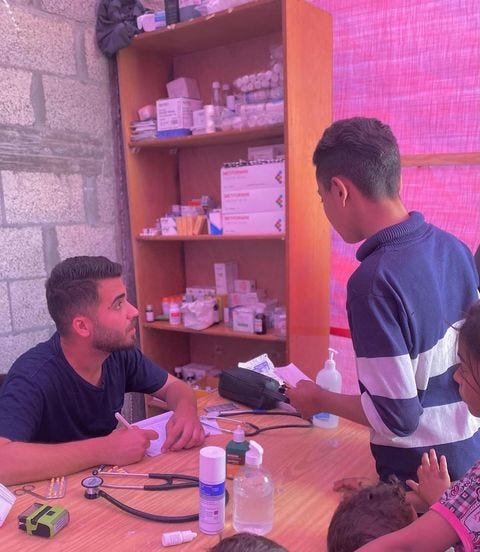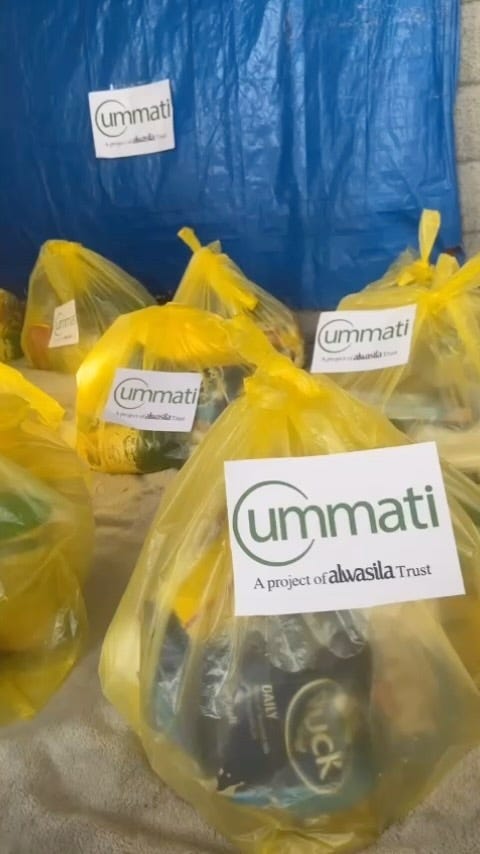Answer Me: Season 1, Episode 6 of My Life as an Ansari
Life with the anxious-avoidant attachment style
Here is Season 1, Episode 6 of this article series — the story of my personal experiences and struggles as I became an Ansari (Helper) of Gazan refugees (Muhajireen). List of all episodes can be found here.
There is a science to love. Whether it’s the parent-child bond, romantic love, collegial friendship, or brotherhood and sisterhood — all types of love seem to follow the same underlying science: attachment theory.
Attachment theory is excellent at diagnosing and predicting behaviors related to attachment / love, but surprisingly few people are aware of this well-studied science. I’ll roll up my sleeves now and try to summarize one or two of its core ideas, relevant to my tale, in my own words (psychologists, please don’t cringe).
In simple terms, all attachment consists of two opposing forces: push and pull. Or to use more scientific terms, avoidance (wanting to push the other person away) and anxiousness (wanting to pull the other person towards you). Based on this, people can have one of four common attachment styles — patterns of how people behave in relationships of attachment / love:
Secure attachment style: normal avoidance (push), normal anxiousness (pull). Think of someone who loves normally and maturely, manages conflicts well, and has healthy boundaries.
Anxious attachment style: normal avoidance (push), abnormally high anxiousness (pull). Think of someone who constantly obsesses over the other person calling them back, and is reading too much into the other person’s words, on the lookout for signs of them leaving.
Avoidant attachment style: abnormally high avoidance (push), normal anxiousness (pull). Think of someone who maintains a distance, stays guarded, and seems to have commitment issues.
Anxious-avoidant attachment style: abnormally high avoidance (push), abnormally high anxiousness (pull). Think of someone who is fearful of rejection, fearful of being abandoned, and has low self-esteem.
So obviously, #2, #3 and #4 are insecure styles of relationship attachment, and can cause issues if not worked on. That last type of attachment style is the rarest one — only about 3-5% of the population is thought to have this type of insecure emotional attachment style.
Maybe you’re starting to see where I’m going with this.
My brother in Gaza did not reply to my last few messages, soon after we had discussed about having a call sometime. Around the middle of June, soon after Eid, the messages from his side stopped. At first, it appeared like the usual gaps that punctured our communication — like after the first couple of days, he would get back to me, apologizing for the delay and the unstable internet connectivity in his camp. But several days passed with nothing from his side.
I should have started to worry about him after the first few days. But there was a telltale sign. Something was different this time. One of his very close relatives was regularly posting on social media as if nothing was wrong. And this particular relative of his, being very close to him, would not at all be acting in this way if there was anything wrong. If anything had happened to my brother in Gaza. This vocal relative would be raising their voice if … something had happened.
As the silence grew longer and longer over the first few days, I realized that the most likely explanation was that … my brother in Gaza was ignoring my messages. This particular silence was lasting a bit too long. Everything else seemed normal — as normal as things can get in a genocide. And I had to face the fact that the most likely reason for the silence was the simplest one: that my brother was choosing not to respond to my messages.
That he was ignoring me.
Very early on in our mentoring sessions, my coach/mentor let me know that I had an anxious-avoidant style of emotional attachment. Abnormally high avoidance (push), and abnormally high anxiousness (pull). The rarest, and possibly most troublesome one. I clearly checked a lot of the boxes for it.
How did I end up with this insecure attachment style? The details are beyond the scope of this article series. Attachment styles develop particularly in early childhood — the healthy or unhealthy development of a secure base is the core of attachment theory. But whatever life experiences I went through, the fact is that moving forward, I need to work on making my emotional attachment style to be secure. I need to heal. Living a mission-driven life for Allah naturally helps with this healing, of course. The mentoring sessions with my mentor/coach help with this in particular, too. With Allah’s aid, I am working on getting there.
There is a fantastic book called Attached by Amir Levine and Rachel S. F. Heller, which presents knowledge on attachment theory in a digestible and practical way. I highly recommend it to those who are interested to learn more about this important subject. I am reading the book now. But at the time when my brother in Gaza was not responding to my messages, I didn’t fully realize what I was going through: that my responses to the situation seem to be textbook examples of how people with abnormally high anxiousness would react.
Craving. As I went about my days, I was literally, in the back of my mind heart, craving a response from my brother. I tried not to feel hurt that he was most likely ignoring me.
I kept feeling the urge to reach out to him, to text him, to elicit some response. But I held myself back. I didn’t want to come across as needy or desperate — even though I felt what I felt.
I also didn’t want to keep checking for his reply, and keep feeling a pang of disappointment when I saw no reply. But I still checked.
How can he ignore me like this? Do I mean nothing to him?
I tried not to feel hurt.
An amazing young man from Gaza happened to reach out to me regarding his fundraiser. Dr Atta Nidal Okasha recently graduated from abroad (Liaquat University in Pakistan). As a fresh graduate medical practitioner, this brother has been volunteering his services from the start of the escalated genocide. He and a fellow doctor have set up Gaza Medical Tent (Instagram link), providing medical services amongst the tents of displaced people:
Recently they have also started the noble and vital work of distributing food to the people being starved:
This selfless brother’s family still has to face the hardships of life under genocide. Three of his cousins were killed by the genocidal occupiers. Being the elder son, he is responsible for his family. He also has a wife, whom he married in August 2023, just two months before the escalation of the genocide. Now he is responsible for two families. And he’s volunteering his time, efforts and resources for the wider community, too.
Please support the life-saving work of Gaza Medical Tent here. Every little bit helps.
Please, please support the family of this hero here.
Jazakum Allah khair. May Allah reward this hero, and everyone who supports him and his family and his critical work.
The attachment system of people with abnormally high anxiousness seems to be chronically activated, which is a fancy and scientific way of saying that once such people perceive a threat to the relationship, they experience thoughts and feelings that compel them to seek emotional closeness with the other person. Experiencing these compulsive thoughts and feelings is called being in the Danger Zone (since the sense of security is compromised), where every signal is viewed as a threat to the relationship. Looking back, I would guess that I was living those days in the Danger Zone, with my attachment system chronically activated.
Seems my brother in Gaza just doesn’t want to talk to me, for some reason.
I held myself back from my compulsive urge to text him again.
Why did I care so much about this, anyways? For whom was I so concerned about? See, for me, this wasn’t a case like Mo’taz Azaiza or Afaf or any of the other big and famous bloggers from Gaza whom I had been following from time to time. I cared about them and their wellbeing too, but it was a one-way relationship, with me watching their public messages to the world. I wasn’t expecting any texts back from them. But my brother in Gaza was someone with whom I had been having two-way conversations. Someone I had connected with, and become attached to.
Someone I expected to text me back.
Life went on, of course, and my brother’s lack of response became a disappointment, a dull soreness, looming in the background. I still kept falling into impulsive doom-scrolling, repeatedly letting the updates on Palestine leave me reeling and more anxious. My WhatsApp status updates perhaps decreased in frequency, but continued.
I don’t think I linked it to my hectic, sloppy activism for Palestine, but my procrastination and general ineffectiveness was at a general high, too. Sure, even before the escalated genocide, I was unfortunately wasting time and not getting important things done, to an extent. But I don’t think I realized at the time how my doom-scrolling was not just unhelpful to others and damaging to my health, but also adding to my lack of productivity.
It took me weeks — weeks — to finally get around to sending that email that I had told Hafsah I would send to the founder of the charity aggregator website. I politely introduced us and asked if he could point us in the direction of someone experienced with charity set up, who could advise Egyptians For Palestinians as they grew and matured. He is a well-known and busy person, so I was not holding my breath for an immediate response.
In the meanwhile, Hafsah and I were unable to have that call we had talked about. Both of us had busy schedules — she was on the ground in Cairo, visiting and helping Gazan refugees in Cairo along with a team of friends and volunteers, and I was busy with my day job. I wanted to speak with her to better understand the current situation of Egyptians For Palestinians on the ground, so that I could engage my colleagues in my company’s Cairo office, to see if any of them would be able and willing to help Egyptians For Palestinians. A couple of times, Hafsah and I had to reschedule. Weeks passed, and it didn’t happen.
I still didn’t tell my family anything about my brother in Gaza, much less about his lack of response. Nor did I mention anything about this to my mentor/coach, the one who had advised me to “leave Palestine alone”, to be more focused on my growth and healing first, and to not stretch myself while already “injured”. What would I say to them, anyways, even if I had wanted to say something? My friend is not texting me back. My little feelings are hurt. Boo hoo.
I tried to think positively in favor of my brother in Gaza. Maybe he was feeling down with everything that was going on, not in the mood to text people. Or maybe he was very busy with, you know, surviving a genocide.
Stop making this about you, Razan. He is literally surviving a genocide.
I held myself back from texting him again, despite feeling the compulsive urge to do it. I restrained myself until a full, long week had finally passed. Once seven days had passed, I did it. I texted him again. I kept it authentic, but hopefully without sounding needy. Here’s what I texted him:
Salam my brother. Just wanted to say hi and check in with you :) Hope you and your family are safe and doing well, I missed talking with you. How are you and how are things?
Would he finally answer me now?
Days passed. I remained confident that my brother was in no immediate danger, by keeping an eye on social media. But still, he didn’t answer.
And why should he answer you? What do you mean to him, anyways? You’re just a wanna-be Ansari.
Even more days passed. And still he did not text me back.
I tried not to feel hurt.
Make a lot of dua for North Gaza especially. Nowadays people there are facing the worst massacres — civilian populations surrounded, being asked to evacuate, yet being fired upon when they try.
Reviving Gaza is a sister charity to Egyptians For Palestinians, but they operate on the other side of the Rafah border — inside Gaza. Hafsah knows them and fully supports them. Even I have met some of them and fully support them. They are carrying out the life-saving efforts of getting resources to areas inside Gaza where aid does not reach or is scarce. They are currently doing a critically vital campaign of getting water to 100,000 people. So many people have already been helped by them (here is their Instagram link for more details and photos and videos). Please save lives; please support this life-saving work. Every donation counts. May Allah reward you abundantly.
Continued in Season 1, Episode 7: Signs. Before you continue, consider becoming a free or paid subscriber to support and to stay tuned:







